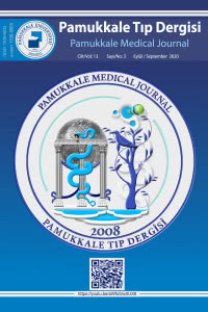Koroner arter baypas cerrahisi ve hastanede kalış süresi: Belirleyici faktörler
Koroner arter baypas cerrahisinden sonra hastanede kalış süresinin uzaması ek sorunlara neden olur.Bu nedenle hastanede kalış süresini etkileyen faktörlerin önceden bilinmesi ile ameliyat öncesindealınacak önlemlerle hastaların ameliyat sonrasında daha kısa sürede taburcu edilebilmelerisağlanabilir. Bu çalışmada kliniğimizde koroner baypas cerrahisi uygulanan hastaların ameliyatsonrasında hastanede kalış sürelerine etkili olabilecek risk faktörlerini değerlendirdik.Kliniğimizde izole koroner arter baypas cerrahisi uygulanan 306 hasta retrospektif olarakdeğerlendirildi. Ameliyat sonrasında hastanede kalış süreleri 7 gün ve daha az olan hastalar grup 1(n=215), 7 günden daha uzun süre hastanede kalan hastalar ise grup 2 (n=91) olarak ayrıldı. İkigrubun perioperatif verileri karşılaştırıldı ve hastanede kalış süresine etkili olabilecek bağımsız riskfaktörleri belirlendi. Hastaların %29,7’si hastanede ameliyat sonrasında yedi günden fazla sürekalmıştır. Lojistik regresyon analizi ile kronik obstüktif akciğer hastalığı, inotropik ajan gereksinimi,mediastinal drenaj miktarı ve yoğun bakım ünitesinde kalış süresi hastanede kalış süresini etkileyenen önemli faktörler olarak belirlendi. Koroner arter baypas cerrahisi uygulanan hastalarda kronikobstüktif akciğer hastalığının eşlik etmesi, operasyon sonrasında inotropik ajan kullanımı gerektirenhemodinamik bozukluk, mediastinal drenaj miktarının fazla olması ve yoğun bakımda yatış süresihastanede kalış süresini etkileyen en önemli faktörlerdir. Perioperatif dönemde bu risk faktörlerineyönelik olarak alınabilecek önlemlerle hastanede kalış süresinin belirgin olarak azaltılabileceğinidüşünüyoruz.
Coronary artery bypass surgery and lenght of hospitalization stay Predictive factors
Prolongation of hospitalization stay following coronary artery bypass surgery is a cause of additional problems. For that reason the discharging of the patients from the hospital in shorter period can be provided by taking measures prior to surgical intervention via previously known factors which may affect hospitalization stay. In the present study we evaluated risk factors which can affect hospitalization stay following surgical intervention in patients undergone coronary by-pass surgery in our clinic. Three hundred six patients undergone isolated coronary artery by-pass surgery in our clinics were retrospectively evaluated. Patients with <7 days hospitalization stay following surgical intervention were included in Group 1 (n=215), patients with more than seven days hospitalization stay were included in Group 2 (n=91). Perioperative data of the groups were compared. Factors determined possible to affect hospitalization stay were evaluated. The percentage of the patients with more than 7 days hospitalization following surgical intervention was 29.7%. In logistic regression analysis chronic obstructive lung disease, requirement of inotropic agent, amount of mediastinal drainage and prolonged intensive care stay were determined as the most important factors affecting hospitalization stay. The presence of chronic obstructive lung disease, requirement of postoperative inotropic agent due to hemodynamic instability, increased amount of mediastinal drainage and prolonged intensive care unit stay are the most important factors affecting hospitalization stay in patients undergone coronary artery by-pass surgery. We suggest that the hospitalization stay can be reduced markedly by taking measures against these risk factors in the perioperative period. (Pamukkale Medical Journal,2008;1(2):91-97).
